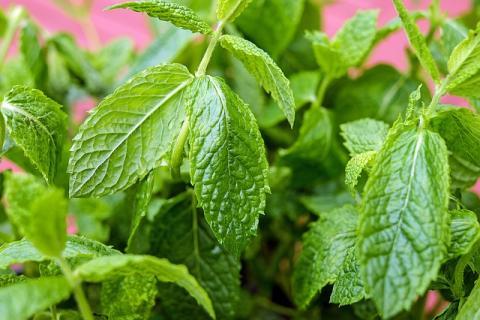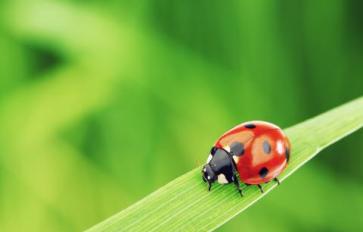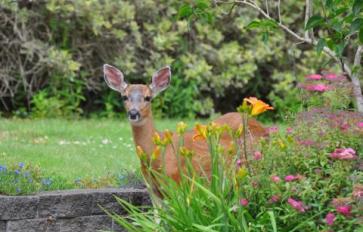
Love plants but hate bugs? Try planting these garden-friendly, bug-deterring plants to make your green patch healthy, blooming and bad-bug free...
Having a garden is a wonderful thing for the mind, body and soul, but the bugs that come along with it can put a wrench in your works. And some of us seem to be natural bug magnets, attracting everything from mosquitoes to flies to pesky gnats. For those of us trying to live naturally, bug sprays are not a viable option and neither are insecticides – though the organic, herbal ones can be a good choice. One great way to make the garden a safe haven for you – and not so much for the bugs – is to introduce some bug-deterring plants. Strongly but pleasantly scented, these plants are a wonderful way to make your garden bug resistant and look beautiful too. Here’s a list of what you can get the next time you make a trip to the local nursery in order to make your garden less bad bug friendly.
Remember that we’re talking about repelling the irritating bugs that do your garden no good, such as mosquitoes, flies, gnats, slugs and snails – not the helpful ones like bees and butterflies.
Plant some trees
There are several types of trees that can act as a deterrent to bad bugs, such as eucalyptus and cedar trees. These trees contain naturally occurring essential oils that bugs like mosquitos can’t stand. What a great way to add some greenery to your yard and keep the pests away! Remember to get the most out of your water source and plant varieties by planting native plants!
A carefully distributed herb garden
Trees are good to keep bugs away from your backyard. But for smaller lawns, patios, balconies and such – you can use potted plants or a carefully planted herb garden closer to entrances and seating areas to provide you with maximum insect protection. In fact, many of the herbs that we plant, use in food and try home remedies with, are natural mosquito and bug repellants.
- Basil: Perfect in salads, and a wonderful addition to soups and curries. Some species of basil also have plenty of herbal benefits; the basil essential oil that gives basil its characteristic smell is not something most bugs like and so they stay away from it. Basil does well in pots, but it has to be protected from frost – potted basil would work well as a bug repellant in covered patios.
- Lavender: Some love lavender and some hate it, but bugs absolutely abhor the smell of lavender and tend to keep away. Lavender essential oil is used in many herbal and aromatherapy remedies and the pleasant fragrance tends to induce a calming effect. You can plant lavender in the garden closer to seating areas and garden edges to get the best bug protection from it. Dried lavender bushels around doorways can also help deter insects.
- Catnip and other mints: Minty smells are yet another insect no-no. While all mints provide a certain amount of bug protection – especially peppermint and spearmint -- it is believed that catnip is very effective in repelling mosquitoes as well as roaches with studies hinting that it may be even more powerful than DEET (N, N-Diethyl-meta-toluamide), the active ingredient in most bug sprays. However, if you are a cat owner, remember that cats love to roll in catnip and tend to get a harmless high from it – so plant catnip away from other foliage lest your feline damages your garden. The best way to plant catnip is in hanging baskets around your seating area and in ways so your kitty cannot reach it.
- Lemongrass and other lemony-scented herbs: Lemon scents are one more category of smells offensive to most insects and it’s not just actual lemons – think lemon balm (actually from the mint family), lemongrass and even citronella plants. The smell will keep away the bugs and make your garden fragrant.
- Rosemary: Great in soups and stews, is a mood and memory booster and also is effective in keeping those pesky bugs away from your garden – a rosemary bush can even keep the slugs and snails at bay.
Many herbs can provide anti-bug action, so go ahead and plant herbs – they’re good for your health and kitchen. Just make sure that you plant a ‘border’ herb garden instead of just one patch – mix them in with other fruit and vegetable plants to get protection for your produce too. Other herbs to consider are dill, bay leaf, chives, oregano and thyme.
Bug-repelling blooms
It’s not just foliage that can repel bugs; some flowers can keep those pesky pests away too – and if you pot them, they can also add an aesthetic touch to an otherwise dull space…
- Marigold: Bright and sunny, blooming marigolds make the garden glow with cheeriness and also contain a chemical called pyrethrum that most flying insects and other garden bugs abhor. Plus, the rather unique scent of the flowers keeps most bugs away. Marigold can be planted around garden borders and even as companion plants along with bug-attracting ones like tomatoes and roses – this will keep bugs away and also protect the blooms and produce.
- Chrysanthemum: Beautiful blooms that also shoo away the bugs – the active ingredient in chrysanthemum is the same as marigold (pyrethrum) and similarly works as your garden’s natural but effective bug fighter.
- Scented Geraniums: Gorgeous to look at, scented geraniums are very pleasantly fragranced – and yet it is this fragrance that bugs like to stay away from, though this plant will attract its fair share of bees and butterflies.
Other blooms that also work in repelling the bad bugs in a garden include nasturtiums, alliums (including garlic and onion), petunias, common lantana (especially effective against mosquitoes) and narcissus.
The bug eaters
It may be a bug-eat-plant world but believe it or not, there are also some plants that tend to reverse nature’s natural order, and eat bugs instead. If your nursery can provide these, try getting exotic insect-eating plants such as the Venus Flytrap, Pingicula, Urticularia or Drosera. The only downside being that the larger species of the pitcher plants also end up trapping and ingesting garden-friendly reptiles and amphibians such as lizards and frogs, and sometimes even baby birds. That said, they are a rather exotic and unique addition to your garden and might come in handy to keep the pest population under control.








